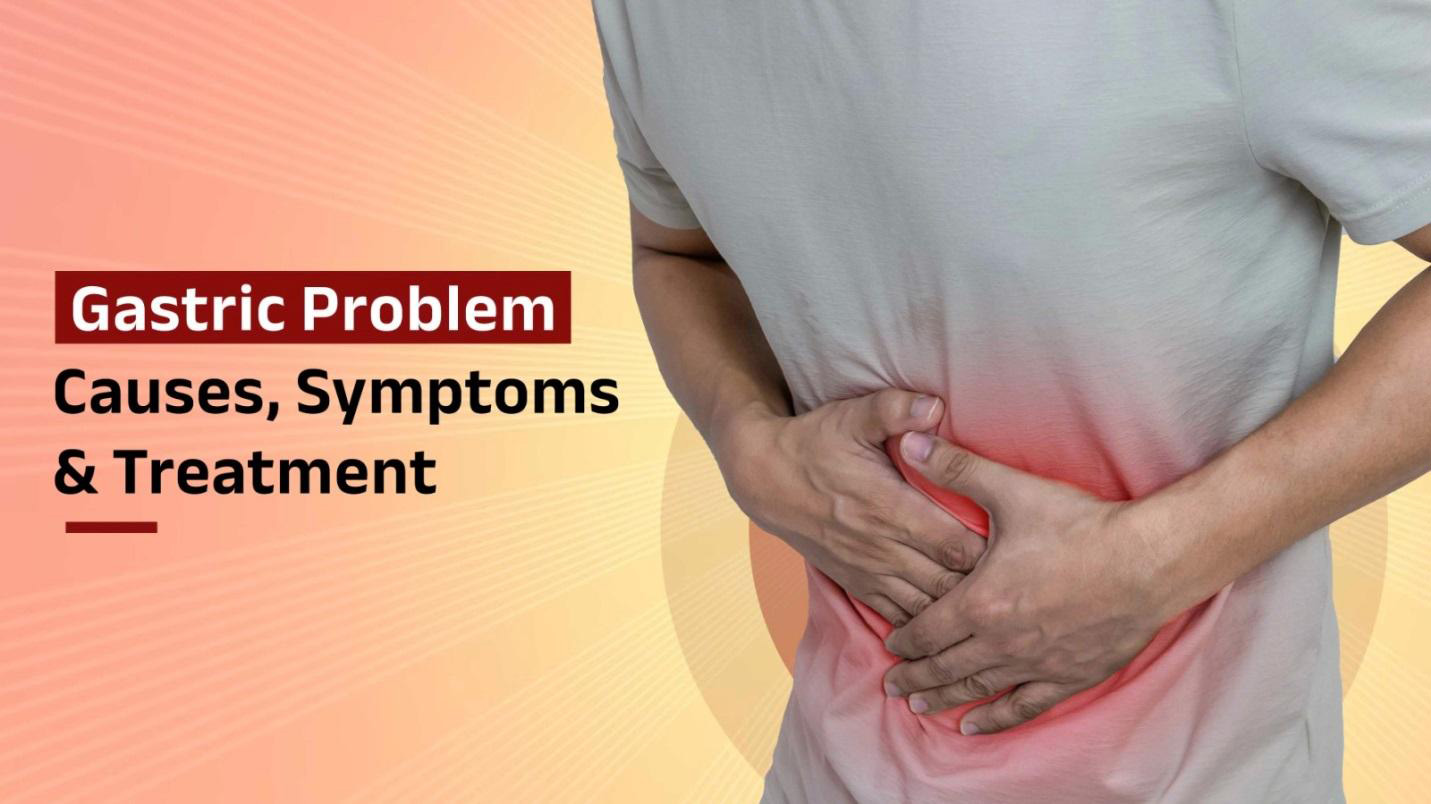गैस्ट्रिक समस्या: कारण, लक्षण और उपचार (Gastric Problem: Causes, Symptoms, Treatment)
Understanding Gastric Problems (Gastritis)
Gastritis is a commonly encountered medical condition that affects the stomach lining, causing inflammation and discomfort. It is a prevalent gastrointestinal disorder affecting people of all ages and backgrounds. Gastritis[1] can be acute, with sudden and temporary symptoms, or chronic, characterized by persistent inflammation and long-term issues.
For diagnosing gastritis, healthcare professionals typically perform a thorough medical history assessment and physical examination and may request additional tests. Treatment for gastritis aims to alleviate symptoms, promote healing of the stomach lining, and prevent complications. Timely diagnosis, appropriate treatment, and lifestyle modifications are essential for managing gastritis effectively and preventing complications. If you experience persistent stomach-related symptoms, we recommend consulting a healthcare professional for proper evaluation and guidance.
Gastric Problems And Their Impact On Daily Life
Gastric problems can encompass a range of conditions affecting the stomach and digestive system. These issues can significantly impact daily life[1], causing discomfort to overall well-being. Here are some common gastric problems and their potential impact:
- Gastritis: Inflammation of the stomach lining can lead to symptoms such as abdominal pain, nausea, and indigestion, which can disrupt daily activities and reduce productivity.
- Gastroesophageal Reflux Disease (GERD): Chronic acid reflux can cause heartburn, chest pain, and regurgitation of stomach acid, leading to disrupted sleep, reduced appetite, and difficulty swallowing.
- Peptic Ulcers: These are painful sores that form on the stomach lining or the upper part of the small intestine. Ulcers can cause abdominal pain, bloating, and fatigue, impacting daily energy levels and overall mood.
- Gastroenteritis: Commonly known as the stomach flu, gastroenteritis causes symptoms like diarrhea, vomiting, and stomach cramps. These symptoms can lead to dehydration, weakness, and frequent urination, hindering daily routines.
- Irritable Bowel Syndrome (IBS): A chronic condition affecting the large intestine, IBS can cause abdominal pain, bloating, and changes in bowel habits. These symptoms can be unpredictable and may disrupt daily plans and activities.
- Gastroparesis: This condition slows down stomach emptying, leading to symptoms such as nausea, vomiting, bloating, and feeling full quickly. Gastroparesis can make maintaining a regular eating schedule challenging and affect nutritional intake.
It's important to note that the impact of gastric problems can vary from person to person, depending on the severity and individual circumstances. Seeking proper medical care, adhering to prescribed treatments, making necessary lifestyle adjustments, and seeking support from healthcare professionals can help mitigate the impact of these conditions on daily life.
Gastric Problems (Gastritis): Causes
The causes[2] of gastritis can vary, and multiple factors can contribute to the condition developing. Here are some common causes of gastritis:
- Helicobacter pylori (H. pylori) infection: This bacterium is a major cause of gastritis. It infects the stomach lining and triggers inflammation.
- Prolonged use of non-steroidal anti-inflammatory drugs (NSAIDs): Regular and long-term use of medications such as aspirin, ibuprofen, and naproxen can irritate the stomach lining and lead to gastritis.
- Excessive alcohol consumption: Heavy alcohol intake can irritate and inflame the stomach lining, potentially leading to gastritis.
- Autoimmune disorders: In some cases, the immune system mistakenly attacks the stomach lining, causing chronic inflammation and gastritis. Autoimmune gastritis is less common but can be a cause[2].
- Bile reflux: When bile flows back into the stomach from the small intestine, it can irritate the stomach lining and contribute to gastritis.
- Viral or bacterial infections: Apart from H. pylori, other viral or bacterial infections can also cause gastritis. Examples include Cytomegalovirus (CMV) infection and Epstein-Barr Virus (EBV) infection.
- Stress: While stress does not directly cause gastritis, it can worsen symptoms and make the condition more difficult to manage.
- Medications: Certain medications, such as corticosteroids and some immune-suppressing drugs, may increase the risk of developing gastritis.
- Other underlying medical conditions: Gastritis can be associated with conditions like - Crohn's disease, HIV/AIDS, parasitic infections, and kidney failure.
- Smoking: Smoking has been linked to an increased risk of developing gastritis and can worsen symptoms in individuals already affected.
Gastric Problems (Gastritis): Symptoms
The symptoms[2] of gastritis can vary depending on the underlying cause and the severity of the condition. Here are some common symptoms associated with gastritis:
- Abdominal pain or discomfort: This may range from a dull, gnawing pain to a sharp, burning sensation in the upper abdomen.
- Nausea and vomiting: Gastritis can cause feelings of nausea and may lead to vomiting, especially after eating or taking medications.
- Indigestion: Individuals with gastritis may experience indigestion or a sense of fullness after eating, even with small meals.
- Bloating and gas: Excessive gas accumulation in the stomach can cause bloating, leading to discomfort.
- Loss of appetite: Gastritis can affect the desire to eat, causing reduced appetite and potential weight loss.
- Heartburn or acid reflux: Some individuals with gastritis may experience a burning sensation or discomfort in the chest, often after meals or when lying down.
- Belching: Excessive belching - burping - can occur due to gastritis.
- Vomiting blood or dark, coffee-ground-like material: Severe gastritis can cause bleeding in the stomach, which may be evident in vomit or stools.
- Black, tarry stools: Gastritis-related bleeding can lead to the passage of black, tarry stools, indicating the presence of blood.
- Fatigue: Chronic gastritis can cause fatigue and weakness, potentially affecting daily energy levels and overall well-being.
- Unexplained weight loss: In some cases, gastritis can lead to unintended weight loss due to reduced appetite and impaired nutrient absorption.
Gastric Problems (Gastritis): Treatment Options
The treatment options for gastritis depend on the underlying cause and severity of the condition. Here are some common treatment[4] approaches:
1. Medications:
- Proton pump inhibitors (PPIs): These drugs reduce stomach acid production, helping to alleviate symptoms and promote healing of the stomach lining.
- Antacids: Over-the-counter antacids provide temporary relief by neutralizing stomach acid and reducing discomfort.
- H2 blockers: These medications reduce the production of stomach acid, providing symptom relief and promoting healing.
- Antibiotics: If an H. pylori infection causes gastritis, you may get prescribed a combination of antibiotics to eradicate the bacteria.
2. Lifestyle modifications:
- Dietary changes: Avoiding triggers such as spicy or acidic foods, caffeine, alcohol, and fatty or fried foods can help reduce symptoms. Consuming smaller, more frequent meals and chewing food properly can also be beneficial.
- Stress management: Practicing stress-reducing techniques like meditation, deep breathing exercises, and engaging in activities that promote relaxation can help manage gastritis symptoms.
- Quit smoking: Smoking can worsen gastritis symptoms, so quitting is recommended.
3. Treating underlying conditions:
- If gastritis is caused by an underlying condition such as an autoimmune disorder or a medication, treating or managing that condition may alleviate gastritis symptoms.
4. Avoiding irritants:
- Discontinue or reduce the use of non-steroidal anti-inflammatory drugs (NSAIDs) if possible.
- Limit alcohol consumption.
Gastric Problems (Gastritis): Complications and Prevention
The complications [1] of Gastritis are as follows:
- Peptic ulcers: Chronic inflammation of the stomach lining can lead to the development of peptic ulcers, which are open sores in the stomach or upper small intestine.
- Gastric bleeding: In severe cases, gastritis can cause bleeding in the stomach, leading to the presence of blood in vomit (hematemesis) or in the stools (melena).
- Anemia: Chronic or recurrent bleeding associated with gastritis can result in iron deficiency anemia due to inadequate absorption of iron.
- Gastric cancer: Although rare, long-standing chronic gastritis, particularly when caused by H. pylori infection, can increase the risk of developing gastric cancer over time.
To prevent Gastritis, you can adopt the following:
- Limit alcohol consumption or avoid it altogether, as excessive alcohol intake can irritate the stomach lining and contribute to gastritis.
- Employ stress-reduction techniques such as exercise, meditation, and mindfulness to manage stress, which can exacerbate gastritis symptoms.
- Maintain a healthy diet with balanced nutrition and avoid spicy or acidic foods that may trigger gastritis symptoms.
- Avoid smoking or quitting smoking, as it can irritate the stomach lining and worsen gastritis.
- Seek medical evaluation and treatment promptly if experiencing persistent or worsening gastritis symptoms to prevent complications.
While these preventive [3] measures can reduce the risk of gastritis, it is essential to note that some causes, such as autoimmune disorders, may not be preventable. Regular check-ups with a healthcare professional can help detect and manage gastritis early on and prevent complications.
Gastric Problems (Gastritis): Living with Gastric Problems
Living with gastritis [1] can be challenging and disruptive to daily life. Gastritis symptoms, such as abdominal pain, indigestion, and nausea, can cause discomfort and make it difficult to enjoy meals or engage in regular activities. The unpredictability of symptoms and the need to carefully manage diet and lifestyle can create a sense of limitation and frustration. Fatigue and reduced appetite associated with gastritis can affect energy levels and overall well-being. However, with proper medical care, lifestyle modifications, and support from healthcare professionals, it is possible to manage gastritis and find ways to adapt daily routines to minimize its impact. Developing strategies to reduce stress, following a personalized treatment plan, and seeking support from loved ones can help individuals navigate the challenges of living with gastritis and improve their quality of life.
Gastric Problems (Gastritis): Home Remedies
While it's vital to consult a healthcare professional for proper diagnosis [3] and treatment of gastritis, some home remedies may help alleviate symptoms [4] and promote digestive health. Here are a few home remedies that one can consider:
- Ginger: Consuming ginger tea or adding grated ginger to meals can help reduce inflammation and soothe the stomach.
- Peppermint: Peppermint tea or peppermint oil capsules may help relieve symptoms of indigestion and provide a calming effect on the stomach.
- Chamomile: Chamomile tea has anti-inflammatory properties and can help soothe the stomach lining and relieve discomfort.
- Probiotics: Consuming foods rich in probiotics, such as yogurt or fermented foods, can promote a healthy balance of gut bacteria and aid digestion.
- Aloe vera juice: Drinking a small amount of pure aloe vera juice can help reduce inflammation and soothe the stomach lining.
- Fennel seeds: Chewing on them or drinking fennel tea can help alleviate symptoms like bloating, gas, and indigestion.
- Avoid trigger foods: Identify and avoid foods that tend to worsen symptoms, such as spicy or acidic foods, caffeine, alcohol, and fatty or fried foods.
- Small, frequent meals: Opt for smaller, more frequent meals rather than large meals to ease the burden on the stomach and aid digestion.
Gastric Problems (Gastritis): Exercise
While exercise remains beneficial for overall health, it's vital to consider individual circumstances and consult a healthcare professional before starting or modifying any exercise routine, especially if experiencing gastritis symptoms. Here are some exercises that may be suitable for individuals with gastritis:
- Walking: Walking at a moderate pace can help improve digestion, reduce stress, and promote overall well-being.
- Yoga: Gentle yoga poses, such as cat-cow, child's pose, and gentle twists, can help stretch and relax the abdominal muscles, aiding digestion and reducing stress.
- Pilates: Low-impact Pilates exercises focusing on core strength, breathing, and gentle movements can benefit individuals with gastritis.
- Stretching: Gentle stretching exercises, particularly those that target the upper body, can help relieve tension and improve circulation, promoting digestive health.
- Breathing exercises: Deep breathing exercises, such as diaphragmatic breathing or the 4-7-8 technique, can help relax the body, reduce stress, and promote optimal digestion.
Gastric Problems (Gastritis): Indian Diet Chart for Gastric Problem
Incorporating specific foods and making mindful choices can benefit individuals with gastritis. An Indian diet chart for gastritis focuses on incorporating easily digestible and soothing foods while avoiding triggers that may exacerbate symptoms. This diet emphasizes using herbs, spices, and ingredients that offer anti-inflammatory and digestive properties. By following an Indian diet chart tailored for gastritis, individuals can aim to reduce discomfort, promote healing, and enjoy flavorful meals that support their overall well-being.
Here is an Indian diet chart that you might find helpful in countering gastritis:
|
Meal Time |
Food Group |
Sample Foods |
|
Breakfast |
Whole Grains |
Oatmeal |
|
Protein |
Boiled eggs |
|
|
Fruits and Vegetables |
Papaya |
|
|
Beverages |
Herbal tea |
|
|
Lunch |
Whole Grains |
Brown rice |
|
Protein |
Grilled chicken |
|
|
Vegetables |
Steamed vegetables (carrots, beans, broccoli) |
|
|
Dairy |
Low-fat curd |
|
|
Snacks |
Nuts and Seeds |
Almonds |
|
Fruits |
Watermelon |
|
|
Bland Snacks |
Boiled potatoes |
|
|
Dinner |
Whole Grains |
Millet roti |
|
Protein |
Grilled fish |
|
|
Vegetables |
Stir-fried vegetables (capsicum, zucchini) |
|
|
Dairy |
Low-fat paneer |
|
|
Before Bed |
Herbal Infusions |
Chamomile tea |
Note: Note that this is only an illustration and that dietary requirements and preferences may differ for different people. It's crucial to speak with a medical professional or a registered dietitian for individualized dietary guidance catered to your particular gastric issue and current state of health.
Gastric Problems (Gastritis): When To See A Gastroenterologist?
It is advisable to see a gastroenterologist [4] for gastritis if you experience persistent or recurrent symptoms that affect your daily life or have concerns about your digestive health. If you experience symptoms like abdominal pain, indigestion, nausea, vomiting, or changes in bowel movements for an extended period, consult a gastroenterologist for a comprehensive evaluation.
Gastric Problems (Gastritis): FAQs
Any health-related issues need appropriate and expert answers. Here are the answers to some frequently asked questions concerning gastric problems.
Q1. Is coconut water beneficial for individuals with gastric problems?
You can find numerous active vitamins, minerals, and nutrients in coconut water. It might have the ability to calm the upset stomach. It can be helpful for people with diarrhea and other stomach infections where there is a loss of water and essential salts like sodium.
Q2. Can bananas help alleviate gastric problems?
Because of their alkaline qualities, bananas are concerned safe for stomach acid. Additionally, this fruit can balance the stomach's acid, preventing the signs of GERD or acid reflux.
Q3. Does consuming curd aid in managing gastric problems?
Curd plays a part in regulating acidity. Like milk and buttermilk, it is a natural antacid. For people with GERD, low-fat yogurt is usually safe to consume. Avoid yogurt with whole fat as it may be tougher to digest and may worsen GERD symptoms.
Q4. Is milk recommended for individuals experiencing gastric problems?
Because they cause a stomach acid imbalance, avoid hot drinks like tea, coffee, cocoa, and milk. Additionally, avoid anything that might contain caffeine.
Q5. Can pomegranate be beneficial for individuals with gastric problems?
Foods like grapes, pumpkins, bitter gourds, pomegranates, melons, and cucumber, among others, may be beneficial for treating gastritis. Ajwain and rock salt are also considered treatments for various gastrointestinal disorders and are helpful in this situation.
Q6. Does lemon provide relief for individuals with gastric problems?
Lemon water is a fantastic remedy for indigestion. The beverage's high level of acidity stimulates the production of stomach acids, which break down the food consumed and speed up digestion. With lemon water, you will also benefit from a good detox and adequate hydration.
Conclusion
In a nutshell, gastritis is a common gastrointestinal condition [5] that can cause discomfort and disrupt daily life. However, with proper management and lifestyle adjustments, individuals can effectively deal with gastritis and minimize its impact. Seeking medical advice for accurate diagnosis and treatment is essential. Along with prescribed medications, lifestyle modifications such as following a gastritis-friendly diet, avoiding trigger foods, managing stress, and practicing good eating habits can help alleviate symptoms.
Additionally, incorporating home remedies like ginger, chamomile, and probiotics may provide further relief. Regular check-ups with your doctor and open communication about symptoms and concerns are crucial for monitoring progress and adjusting the treatment plan as needed. Individuals can successfully manage gastritis and improve their overall well-being with the appropriate guidance.
Get Expert Gastroenterology Care at DPU Hospital
Consult your doctor or gastroenterologist if you suspect you have gastric problems. If you are unsure which doctor to contact, contact our experts at DPU Hospital. If the doctor believes your condition is serious, they may refer you for advanced treatment. Our certified and experienced gastroenterologists specialize in advanced surgery and can conduct an evaluation. So, request an appointment with the doctor today.
References:
[1] https://my.clevelandclinic.org/health/diseases/10349-gastritis
[3] https://www.hopkinsmedicine.org/health/conditions-and-diseases/gastritis









